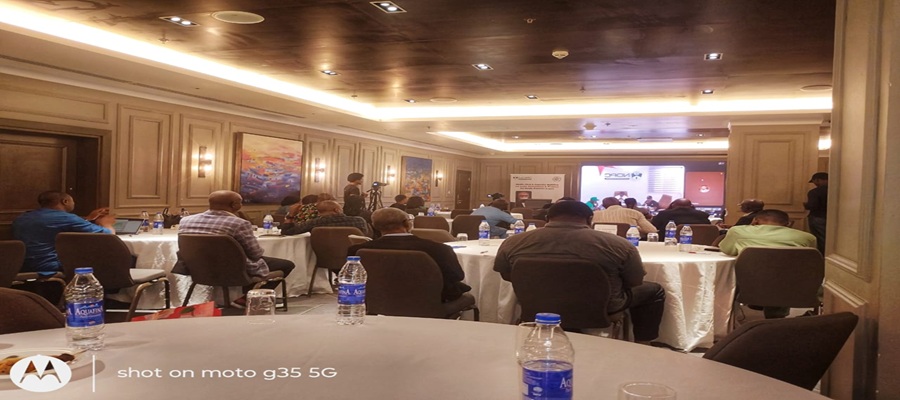General News
9mobile Empowers Journalists in Second Edition of Media Workshop

In keeping with its commitment to strengthen and advance the growth of Nigeria’s media profession, 9mobile recently held the second edition of its capacity-building session for journalists drawn from across different news desks.

Themed “News Reporting: Using Analytics in News Gathering and Understanding of Audience Profile”, the session was facilitated by experienced multimedia producer and social media strategist, Usifo Omozokpea, who is currently the Audience Development Manager (West Africa) at The Conversation Africa.
According to Omozokpea, the use of analytics in news gathering is critical in navigating the ever competitive battle for attention.
“The dynamics of journalism has long changed. In addition to dealing with a dwindling budget, news outlets are faced with attracting audience attention; the audience can no longer be taken for granted. This poses a central challenge for journalism as its role is premised on connecting with an audience,” he opined.
Speaking further, “analytics is a two-sided thing, the content and audience analysis. To this end it has become necessary for journalists to equip themselves with the knowledge of their target audience using data and analytics,” he added.
Omozokpea noted that audience data is a complement to the journalist’s intuition.
According to him, “there is always the firsthand experience. What analytics does is to provide guide on how to tell the story better using appropriate headlines, graphics, photos, descriptions etcetera, while keeping the audience in mind.”
Commenting on the session, Abdulrahman Ado, Executive Director, Regulatory and Corporate Affairs, 9mobile, represented by 9mobile’s PR Lead, Chineze Amanfo, described the choice of topic and facilitator as apt given the robust response from participants.
She said, “We appreciate the fact that this training session was worth the time spent. The immediate feedback of participants indicates clearly that the session has not only been interesting, but very insightful and refreshing. We will continue to provide the platform to equip our media partners with the skills required to scale up their practice and adapt effectively to the rapidly changing news landscape.”
She added that given the scope of the topic and the interest it has generated among participants, the next session may also be dedicated to discussing the subject matter more extensively.
Deji Fakorede, one of the participants at the 9mobile training session remarked that it was insightful, relevant and timely as well.
While appealing that the initiative should be sustained overtime and expanded to include more journalists, he noted that the objective of the initiative is laudable and compelling and capable of driving a big change in the Nigerian media landscape.
The capacity training session was the second edition in the series, and had in attendance journalists from both print and online news platforms as participants.
General News
Nigeria’s Data Privacy Economy Hits ₦16.2bn – NDPC Commissioner

Nigeria’s data privacy ecosystem has generated an estimated ₦16.2 billion in less than two years, according to the National Commissioner of the Nigeria Data Protection Commission (NDPC), Dr Vincent Olatunji.

NDPC
Speaking during a virtual press conference at a capacity-building engagement held at the Marriott Hotel, Ikeja, Lagos, Olatunji said the figure reflects the growing importance of data protection in Nigeria’s digital economy.
He noted that the Commission’s initiatives have created jobs, boosted compliance, and strengthened trust in digital transactions.
Olatunji explained that Nigeria’s journey in data protection began in 2019 with the establishment of the NDPR framework, which later evolved into the NDPC.
Since then, the Commission has focused on building awareness, strengthening compliance, and creating a robust ecosystem that integrates technology, collaboration, and sustainability.
He highlighted Nigeria’s active role in the Network of African Data Protection Authorities (NARPA), stressing that the country has emerged as a continental leader in privacy regulation.
In December 2025, the NDPC won the Picasso Award as Africa’s most outstanding data protection authority, a recognition he said underscores Nigeria’s growing influence in the global privacy space.
Responding to questions from journalists, Olatunji assured that the Commission is committed to protecting the rights of data subjects, including the ability to correct or ratify personal details on government platforms.
He urged citizens to report violations to the NDPC for immediate intervention.
On concerns about international data transfers, particularly agreements involving Nigeria and foreign governments, Olatunji said the Commission would continue to monitor such arrangements to safeguard national interests and ensure compliance with data protection laws.
He concluded by stressing that data privacy is central to Nigeria’s future economy, calling for sustained investment in human capital, technology, and regulatory frameworks to build trust and confidence in the digital space.
General News
How Plot to Topple Tinubu was Uncovered, Foiled

A covert intelligence operation coordinated by the Army Headquarters and the State Security Service (SSS) helped thwart a deadly plot to overthrow President Bola Tinubu’s government and assassinate key political figures, PREMIUM TIMES can authoritatively report.

Multiple senior administration insiders said the plot began to unravel in late September 2025 after an unnamed military officer with direct knowledge of the coup contacted the Olufemi Oluyede, then Chief of Army Staff.
The officer reportedly disclosed the scheme, saying he feared being implicated as an accessory to treason if he failed to alert authorities.
Our sources said around the same time, the SSS independently gathered intelligence indicating that some serving army officers were plotting to “destabilise the government and undermine Nigeria’s democracy.” An official familiar with the matter said Oluwatosin Ajayi, director-general of the SSS, personally briefed Mr Oluyede on the findings.
Faced with converging intelligence from multiple sources, the two security chiefs agreed to act swiftly. A wide-ranging but discreet joint operation was launched by the army and the SSS, with coordinated arrests planned across different parts of the country to neutralise the coup’s masterminds and other collaborators.
On 30 September 2025, as President Tinubu travelled to Imo State for an official visit, unaware of the plot to depose and possibly assassinate him, the joint operation went into effect. The sweep led to the arrest of the alleged principal architects of the coup, alongside other military and civilian suspects.
Emmanuel Undiandeye, chief of Defence Intelligence (CDI), and the then Chief of Defence Staff, General Christopher Musa, were subsequently briefed.
Mr Undiandeye was then requested to detain the suspects in the underground holding facility of the Defence Intelligence Agency.
Following the initial arrests, President Tinubu was formally informed of the foiled plot. A visibly shaken president immediately ordered the cancellation of the 1 October National Independence Day parade. He also approved the constitution of a special investigative panel, which later led to additional arrests. The investigative panel was led by General Undiandeye.
One of the detained soldiers later escaped custody but was rearrested by SSS operatives in Bauchi, a military insider said.
Meanwhile, a retired officer identified as General Adamu and a former governor, Timipre Sylva, accused of bankrolling the coup plotters, remained at large.
Tinubu later fired and retired General Musa, then Chief of Defence Staff, as well as the chiefs of the navy and air force. My Oluyede was appointed CDS and promoted to the rank of General. Weeks later, Mr Musa returned to government as Minister of Defence.
In a statement issued on 4 October, the Defence Headquarters said the arrested officers were being investigated for “indiscipline and breach of service regulations.”
It added that preliminary findings suggested the officers’ grievances were linked to “career stagnation and failure in promotion examinations.”
Despite mounting evidence and a series of detailed reports by PREMIUM TIMES and other media outlets, the military repeatedly denied that a coup plot existed.
In an 18 October statement, the Defence Headquarters described the probe involving the 16 arrested officers as a routine internal investigation aimed at maintaining discipline and professionalism within the armed forces.
However, on 26 January, the military publicly acknowledged for the first time that officers had indeed plotted to illegally overthrow President Tinubu’s administration. It announced that those indicted would be arraigned before a military judicial panel.
According to the Defence Headquarters, the investigation was “comprehensive” and conducted in line with established procedures, examining “all circumstances surrounding the conduct of the affected personnel.”
It said the findings revealed “a number of officers with allegations of ‘plotting to overthrow the government,” describing such conduct as ‘inconsistent with the ethics, values and professional standards required of members of the Armed Forces of Nigeria.”
“Accordingly, those with cases to answer will be formally arraigned before an appropriate military judicial panel to face trial in accordance with the Armed Forces Act and other applicable service regulations,” the statement added.
In an earlier report, PREMIUM TIMES quoted sources with direct knowledge of the investigation as identifying top officials allegedly marked for assassination. They include President Tinubu, Vice President Kashim Shettima, Senate President Godswill Akpabio, and Speaker of the House of Representatives, Tajudeen Abbas.
“There are other people targeted,” one source said. “But those are the key targets.”
The plotters also planned to detain senior military officers, including the service chiefs. “They did not want to kill them,” the source added.
According to the sources, the conspirators intended to assassinate the political leaders simultaneously. “They were waiting for a day when all of them would be in the country,” one official said. “Wherever they were, they would be assassinated.”
The sources said the plotters relied on informants within the Presidential Villa and around the officials slated for elimination.
“They have people inside the Villa who monitor the movements of these officials,” the source said. “The plan was to kill them at the same time and install a military government.” (PREMIUM TIMES)
General News
Moniepoint Marks 10 Years of Transforming Nigerian Businesses

Moniepoint Inc., Nigeria’s definitive platform for small businesses and Africa’s all-in-one financial ecosystem, today released its 2025 Year in Review, marking a decade of “financial happiness” and a transformative year of growth.

Moniepoint
Highlighting its role as the backbone of Nigeria’s entrepreneurial economy with over 6 million active businesses, the company revealed that its microfinance bank has now disbursed over ₦1 trillion in credit to thousands of businesses from provision stores and supermarkets to building materials sellers.
It is worthy to note that on average these businesses experienced growth by more than 36% after accessing credit, signposting its primacy as a transformational growth level and instrument of deepening shared prosperity.
Moniepoint uses alternative data points that include transaction histories, business patterns and payment behaviours in a bid to accommodate what traditional credit scoring misses to drive financial inclusion and access to credit.
The company’s 2025 performance reinforces its role as a critical financial infrastructure which not only supports the Nigerian economy, but also impacts everyday lives, creating immense value.
Founded in 2015 by Tosin Eniolorunda and Felix Ike, Moniepoint Inc (formerly known as TeamApt Inc) has established itself as the leading financial platform for Nigeria’s vast network of small and medium-sized businesses (SMEs), offering an integrated suite of services, including digital payments, business bank accounts, credit, foreign exchange (FX), and management tools.
During the year, as Nigeria’s largest merchant acquirer, now powering 8 out of every 10 in-person payments made across the country, Moniepoint MFB, the banking and payments subsidiary, processed ₦412 trillion in transaction value handling more than 14 billion transactions. This clearly suggests that Moniepoint is well-positioned to play a greater role in Nigeria’s steady march towards a trillion dollar economy by 2030.
“Our journey has been one of intentional evolution,” said Tosin Eniolorunda, Group CEO and Founder of Moniepoint Inc. “What started as a passion to solve overlooked problems has evolved into a platform powering the dreams of millions.
“As 83% of employment in Africa exists in the informal economy, our mission to create financial happiness is an operational mandate that guides our product development, our market expansion, and our capital allocation decisions.”
Beaming with enthusiasm, Eniolorunda continues, “Yet for all we have accomplished, we approach our second decade with the clarity that our work remains unfinished.
“As we enter this next chapter, we do so with strengthened conviction in our strategy, deepened partnerships with world-class institutional investors, and an organisation scaled to deliver on Africa’s entrepreneurial potential.
“The infrastructure we have built over the past decade provides the foundation. The journey is far from over, but our resolve has never been stronger. To our partners, our customers, and our team: thank you for a decade of impact. We are just getting started.”
In 2025, Moniepoint Inc. reached a series of critical inflexion points, highlighted by the successful completion of its Series C funding round, which raised over $200 million in equity financing from leading institutional investors, including Development Partners International, Google’s Africa Investment Fund, Visa, the International Finance Corporation, and Verod Capital.
The year also marked the launch of MonieWorld in the United Kingdom, extending Moniepoint’s platform to serve the African diaspora by strengthening key remittance corridors and laying the foundation for the delivery of comprehensive cross-border financial services.
Moniepoint MFB re-launched its savings product in a firm demonstration of the company’s commitment toward its’ oft stated mantra of providing financial happiness. Data reveals in terms of savings behavioral patterns, the majority of users choose to save on a daily basis, with focus across business operations (24%), rent (16.5%), and education (10%) representing top savings priorities.
The launch of Moniebook and the acquisition of a national Microfinance Bank license for Moniepoint MFB further expand the company’s regulated capabilities and product depth.
TeamApt Ltd, the switching and processing subsidiary of Moniepoint Inc., also achieved major regulatory and operational milestones in 2025 that have solidified its position in the global payments landscape. After a rigorous certification process, the company successfully secured licenses from Mastercard and Visa to act as a processor and acquirer for these global card schemes..
This strategic move allows TeamApt to support international card payments directly and offer these critical switching services to other businesses across the continent.
Monnify, the web payment gateway processed N25 trillion in the period under review, demonstrating remarkable resilience and industry confidence firmly positioning it for more business-to-business transactions.
Moniepoint’s impact extended beyond banking into critical social interventions even as the company partnered with the Federal Government to support the Rice Intervention Programme, reaching nearly 850,000 beneficiaries, and worked with the Kaduna State Government in grants disbursement to vulnerable citizens.
Through these initiatives, Moniepoint continues to build the infrastructure required to unlock Africa’s entrepreneurial potential, positioning itself as a trusted partner for the delivery of large-scale economic empowerment programmes.
As Moniepoint Inc. enters its second decade, its well chronicled decade-long evolution from a backend technology provider to a household name, directly complements the Nigerian government’s vision of a more inclusive, data-driven, and productive financial landscape. To read more about the 2025 Year in Review Report:, visit http://2025.moniepoint.com

 Telecom2 days ago
Telecom2 days agoPolice Bust ₦7.7bn Telecom Hack Gang, Seize 400 Laptops in Massive Fraud Swoop

 General News2 days ago
General News2 days agoNaira Smashes Through ₦1,400 Barrier in Official FX Rally

 General News2 days ago
General News2 days agoNCC Slaps ₦250,000 Fee on Trial Licences to Spur Telecom Innovation

 News2 days ago
News2 days agoFirms Commit to Boost African Robotics Market

 E-Financial2 days ago
E-Financial2 days agoUBA launches instant digital platform for seamless account opening across Africa, diaspora

 E-Financial2 days ago
E-Financial2 days agoKuda MFB Secures National Microfinance Banking Licence, Sets Stage for Nationwide Growth

 Telecom2 days ago
Telecom2 days agoAmazon Axes 16,000 Jobs Worldwide in Major Restructuring Push

 General News2 days ago
General News2 days agoKaspersky Reveals How Digitalisation is Influencing Family Life



























